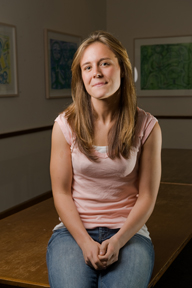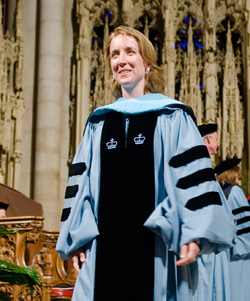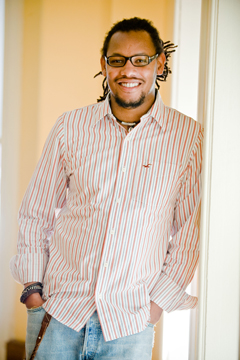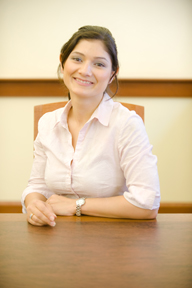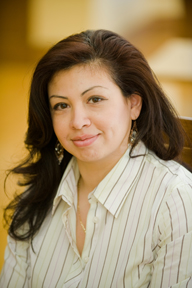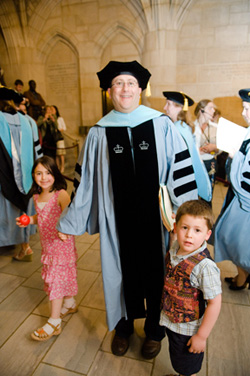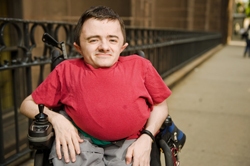Meet Our Graduates!
TC's 2008 graduates-'"at both the masters and doctoral level-'"are a diverse and diversely talented group. Meet some of them here in our Graduates Gallery.
TC’s 2008 graduates—at both the masters and doctoral level—are a diverse and diversely talented group. Meet some of them here in our Graduates Gallery.
KRISTEN DELANEY, M.A., DEPARTMENT OF EARLY CHILDHOOD AND CURRICULUM AND TEACHING
I’ve always been interested in education. My mom and my grandmother are both educators.
When my mom was getting her doctorate at TC, I went to the Center for Infants and Children [now the Rita Gold Center for Early Childhood Education] until I was two. At home we have this pamphlet for the Center, and there’s a picture of me on the front with my mom, back in the day. My last student teaching experience at TC was at the Center, and that was really cool, to be back there teaching two-year-olds. I recently finished a developmental summary on one of the children there, and I have my own developmental summary that was written about me when I was that age.
My favorite thing about TC is that I have met such a wonderful group of young women in my cohort. We’re all from different backgrounds and places, but we have a common interest in children. Being a young teacher, it’s nice to have that group of close friends who will help you grow and work in the field.
I’m from a small town in Connecticut that is not very diverse, so coming to TC and working in New York City and having my practicum experiences in New York City really offered me a whole new perspective on what it is like to work with children from all different backgrounds. I taught in a self-contained special ed pre-K for children with multiple disabilities, which was a very life-altering experience because it taught me to how to work with all children, even children who cannot talk or who are in chairs and hooked up to feeding tubes.
One issue in my practicum work has been about labeling children early who have disabilities versus just giving them a general label that doesn’t necessarily address their exact needs. People often feel that a specific label causes the bar not to be raised as high because then you just think, Oh, well, that child is only capable of so much. But I believe that in dealing with parents, you have to tell them what you see, and give them a realistic picture so that you can then address the child’s issues. And I think that labeling disabilities allows you to do this better, and I think it allows for parents to come to terms with things better, too.
PAM GINEX, ED.D. IN NURSING EDUCATION
For the past nine years, I’ve worked as a research nurse on the thoracic surgery service at Memorial Sloan Kettering Cancer Center. I care primarily for patients who have cancer of the lung and esophagus. Most are smokers. It’s definitely an addiction, and it’s difficult to quit. People do, but they need help, both pharmacologically and through behavior therapies.
My goal is to be a nurse educator, working at a university and doing research, as well. There are other doctoral programs for nurse practitioners, but TC’s is unique in teaching you to be a good educator. It gave me the experience to become a professor, but also to do research.
I’ve done secondary analysis of research by Professor Kathleen O’Connell on smoking cessation. I’d had a lot of experience through my job running and coordinating studies, but I didn’t have the experience of analyzing data and interpreting it. So this was a good fit for me. My focus has been on the invasive thoughts smokers have—the images of cigarettes and so forth—when they’re trying to quit. That’s especially critical during the first few weeks, because that’s when most relapses occur.
I learned that having these thoughts makes it harder to quit. But the good news is that patients who had more of these thoughts also were able to resist more. It’s important to understand those patterns so that you can guide people as they try to stop smoking.
I took a lot of classes in higher education, with Steven Brookfield, Anna Neumann and others. I liked sitting in classes with people who are going to be teaching history, art, education. We all had our own expertise, and we all learned from each other.
It was challenging, working and going to school, because I also became a mother. Right after I passed my comps, I had two boys, nine weeks prematurely. I took time off from school until they were bigger and situated out of the hospital. They’re great now, almost three, running around, talking and playing. You’d never know they were early.
I have two future options. I could seek a full time teaching position, but I don’t have a lot of actual teaching experience, because my family responsibilities kept me from doing an internship or adjunct. So the alternative is to stay at work for another year and do a post-doctoral fellowship while serving as an adjunct. And then I could apply for teaching position.
TAVIS JULES, ED.D., INTERNATIONAL AND TRANSCULTURAL STUDIES
I was born in Guyana and lived there until I was 21. I came to the U.S. with my mother in 2000. I enrolled at Mercy College in upstate New York and earned my associate’s and bachelor’s degrees in two years. I thought I would go to law school, but then I took a one-month intensive course at Columbia in conflict resolution and mediation, and I fell in love with it.
I enrolled in TC’s master’s program in International and Transcultural Studies and ended up specializing in the doctoral program in International Education Policy Studies. I’ve always thought that my education experience should be global, because in order for me to make generalizations I need to know what’s going on in the world.
I didn’t want to write a dissertation that would sit on a shelf, but instead, something that could guide policymakers. After months of soul searching, I decided to try to understand the educative system in the Caribbean. It’s a system that has its heredity in British colonialism. The 13 countries I studied were all once British colonies. They are now part of the economic arrangement called the Caribbean Community or CARICOM. [Guyana, a founding member of CARICOM, is located on the mainland of South America.]
The goal of CARICOM since its founding in 1973 is to have a common currency and common economic space. The largest of the 13 countries [today there are 15] has just 3 million people, yet the region wants a voice on a global scale. CARICOM is struggling with how to equip citizens and future generations to think and act regionally, yet function as part of the global economy. What should 21st century education look like across these 13 countries as increasingly they no longer consider themselves 13 separate countries but instead, one seamless economic borderless state?
I am fascinated by how education can transcend borders and how that affects alignment across the region. I want to understand what geographic education really means. At what points are these countries converging?
CARICOM has been successful, but there’s a long way to go. In Guyana, for example, the literacy rate is 98.8 percent, but schools are being built without electricity and toilets. On paper it looks like these areas are moving ahead, but when you look at the reality, they really aren’t.
I am interested in the policy aspects of my work, but at some point, I feel that if I don’t look at implementation, then I will lock myself in an ivory tower.
I would love to give back to the Caribbean. I got a really good education in Guyana. I didn’t go to the top schools, yet I still had a secondary education and made it this far. So the region comes first. If the region wants me to work there, and if they think that I can contribute sufficiently, I am more than willing to go. I will go wherever I am needed. If I can make a difference in one person’s life, I will, regardless of where that is.
Being at TC in the Department of International and Transcultural Studies gave me the opportunity to go across ethnicity, sexuality and gender lines. I started seeing people for who they are, without judging them. Hands down the best thing for me at TC has been my colleagues and the range and diversity of their knowledge. It is so rewarding that outside your professors you have 30 friends, and you can call them, and they are there for you.
I’m coming from an education system, in Guyana, that emphasized rote learning. Something was placed on the board, and you studied it for an exam. Now I’ve spent five years where everyone is equal in a class and everyone listens and is able to challenge another person. This program has prepared me to become an effective listener, and to manage personalities and professional relationships.
AYGUL KABACA, M.A., ANTHROPOLOGY AND EDUCATION
I came to TC on a Fulbright in 2006. Previously I had studied at the London School of Economics.
Since childhood, I’ve wanted to work in humanitarian settings. I know many people doing social work in their own communities here in America or Sweden, and I admire that, but I’ve always wanted to work abroad—mainly in sub-Saharan Africa or Southeast Asia.
I like to think my multi-cultural background—being from two religions and two cultures—has something to do that. I was born in Sweden, and I’m half Swedish, half Turkish. My father is a practicing Muslim. My mother was raised as a Christian, but now she probably has a stronger belief in science.
I grew up in a middle-class suburb of Stockholm. I was the only dark-haired girl, with a strange name, so everyone knew who I was. I never had any issues with my identity—no one ever bullied me—but I’ve often had to explain who I am. In Turkey I’m seen as Western; in Sweden, I’m exotic; in the U.S. I have an accent, but it’s not Swedish; and in the U.K., I’m American.
At TC I’ve been influenced more by people than by topics or classes. In other fields, maybe it’s purely about credentials on paper, but for this, you need connections to do as much good as you can.
Last summer, through TC’s branch campus in Tokyo, I traveled to Cambodia with 16 other students. We evaluated a CARE International program to help the area reach UN millennium goals. There were no education programs in the village until recently—the effect of the Khmer Rouge era.
We stayed in a tiny village in remote region of the Northeast—just four streets and a market. There were malaria flies and it was very muddy, because it rained every day. There were no roads—just sand and mud. I had traveled a lot and seen very poor conditions in Asia, Africa and India, but this was the first time I spent such a long time in an area like that, not as a tourist but becoming more a part of the community—though I’m sure to the villagers I was a tourist.
My goal now is to work with an NGO doing humanitarian work, focusing on education. Ideally with UNESCO or UNICEF, but there are plenty of smaller, less-known NGOs doing great work.
TED KESLER, ED.D., CURRICULUM AND TEACHING DEPARTMENT; CURRENTLY A FIRST YEAR ASSISTANT PROFESSOR AT QUEENS COLLEGE
I did my Master’s degree in the Curriculum and Teaching Department after teaching for two years in the South Bronx.
My mom died when I was 11, so I don’t look at childhood as an age of innocence. So many children out there have difficult lives. My main concern is the children who are struggling in mainstream classrooms. Often, they’re English language learners or inclusion students, but some have never been targeted with an IEP [individual education plan] or any kind of designation.
I gravitated towards the elementary school level because the best learning defies subject area categorization, and children at that age don’t yet go from one subject area to another. So, for example, when I taught first grade, we did a study of garbage and recycling. We went to a recycling center, We-Can, and explored how much garbage was collected in a day. That connected to volume in mathematics. We combed through garbage cans in school, which connected to archeology and anthropology. We went to an exhibit by Calder, who was a master of taking recycled objects and turning them into beauty, and then we did the same thing.
In 1996, a Times reporter wrote a series on how I prepared my students for the new third grade standardized tests. I had 28 children, some reading at an emergent reading level—really an “emergency” level—and some reading The Lion, the Witch and the Wardrobe. That experience was a defining moment for me. I had people debating my teaching in the Times’ editorial pages from all over the country, and it was not all rosy. But it helped me clarify what I thought. The tests are like a weight on teachers’ shoulders, and you have to ward it off from the children so they can breathe. You have to proceed with healthy instruction that promotes inquiry and engagement, connects with their lives and motivates them to want to learn.
I also reached a point where I wanted to know where things were coming from in the larger world of education. Because what teachers do is steeped in theory—they just don’t know it. I got that grounding at TC, and I wrote my doctoral thesis on how standardized testing under No Child Left Behind affects classroom instruction. NCLB claims that if only we had highly effective teachers who received state-of-the-art staff development, all children would achieve, and achievement would be reflected in their test scores. But I found that, even with highly dedicated, well-educated teachers, enormous amounts of instructional time were being given over to the tests. The students most at risk became further entrenched. My conclusion was that NCLB is a disservice to the children who need the most help making their way into academic life.
I believe that if disengaged children can understand how schools position them or how they can reposition themselves, or know whose perspectives are being told and that they can take a different perspective, then they can redefine who they are. But it can’t wait. They need to know from kindergarten on that knowledge gives you a voice in the world.
JOE KING, M.A., PSYCHOLOGY AND EDUCATION IN THE CLINICAL PSYCHOLOGY DEPARTMENT
My disability is osteogenesis imperfecta, or brittle bones. I’ve had 47 broken bones. So it freaked my parents out, my moving here from Oklahoma. They were like, You wanna move where? And it’s been challenging. Getting around the City in a wheelchair in the snow is challenging. But there’s a lot to see and do. You just find ways of adapting to the environment.
I hope to go into mental health research—psychological adaptation to disability. I’m really interested in health policy, so I got an internship last summer in the Office of Disability in the Department of Health and Human Services in Washington. The year before, I had helped write a chapter on health disparities with Dr. Keller [Richard Keller, Assistant Professor of Psychology and Education, and Director of Services for Students with Disabilities] for Dr. Wallace’s book [Toward Equity in Health: A New Global Approach to Health Disparities, edited by Barbara Wallace, Professor of Health Education]. Our society guarantees every person an equal education, yet we don’t guarantee everybody equal access to health care. When you don’t have that access, it prevents employment and education, and it shortens your life as well.
I also worked with TC’s micro-aggressions lab, looking at unconscious acts against persons with disabilities. To an extent, everybody with a disability experiences these micro-aggressions—and sometimes overt, hostile discrimination, as well. Because I know the experiences, I could tell the researchers what that’s like.
It’s almost taboo to talk about diversity, race and ethnicity, because you don’t want to offend somebody. But you can ever stop working on it, because when you do, you become lax. And the more we talk about it, the more we can shape our policies and our minds to recognize and to celebrate diversity—and also what we have in common with each other. We have to have both conversations in the same breath.
The experience at TC is what you make of it. You can go to class and go home, or you can get involved. I became Diversity Senator, then Parliamentarian, then Vice President. We had a great group of senators—a very active group that got things done for the students and the institution. The academics are what you make of them, too. You can pursue challenging courses and professors, or just take the bare minimum. You’ve got to decide what you want, then tailor your experience to your desires and future goals.
PATRICIA LOPEZ, M.A., HEALTH AND HUMAN BEHAVIOR—ACCEPTED THE DOCTORAL PROGRAM IN HEALTH EDUCATION
I came to the U.S. from Argentina when I was six.
I’m a single mom, and it took me 10 years to get my bachelor’s degree. I took time off and worked helping low-income people attain free or low-cost health insurance. Before that I’d been bar-tending, so it was really my first career job.
Four years ago, my mom got sick with breast cancer and died in three months. Her sister in Argentina had already died of cancer, and then another sister also died of breast cancer. It was horrible, but it made me think. I was overweight, living a very unhealthy life style, and my own risks of breast cancer were through the roof. I began eating better, going to the gym—I even took a certificate course in nutrition. I thought about TC, but my grades weren’t good enough, and I couldn’t afford it.
Then I heard about a job with Professor Basch [Charles Basch, Professor of Health Education], working on his study of retinopathy screening among people with diabetes. The goal was to see if health education conducted over the phone would help get people to go for dilated eye exams. I was hired part-time, then full-time with tuition exemption credits.
In my first class, with Dr. Ray Marks, we did a group power point presentation on the trans-theoretical model, which describes the stages people go through in changing their health behavior. As I studied the model, I said, This is what happened to me after my mom passed. That’s what I ended up speaking about, and I got an A plus. Afterwards, Dr. Marks said, I see you applying your stories for other people.
I’ve tried to do that in my work for Dr. Basch. These are very disadvantaged, low-income patients who don’t have the best health insurance. They work crazy hours and take care of others. A lot of them didn’t know the difference between a regular eye exam and a dilated one. Or they felt, Everything’s OK because I can see well, I feel well. But diabetic retinopathy is asymptomatic, you don’t feel it, and if you don’t get checked regularly, you can lose your eyesight.
Now I’m project coordinator for a new study at Columbia on health care disparities between Caucasian and African American women with breast cancer. We survey them at every stage of their care about their coping mechanisms, their treatment, their doctors, and ask, Are there disparities and how does that play out?
It’s been very humbling for me to do this work, and very empowering, too. I feel blessed. •
Meet Our Graduates via video
To view the full videotaped interviews of the 2008 TC graduates featured here in Inside plus those below, visit
www.tc.columbia.edu/news/article.htm?id=6621.
Delciane Wright, M.A. in Computing in Education, discusses her path to Teachers College, the current state of mathematics in education, and her passion and plans for the future in the fields of mathematics and technology in education.
Brette Wolff, M.A. in Developmental Psychology, discusses her experience in the developmental psychology program, her decision to transfer from one program to another, and her plans for the future.
Jenelle Vasconcellos, M.A. in the Teaching of Social Studies, discusses coming to education from the perspective of a college recruiter; her current classroom work at the Bronx International High School, where she teaches 12th-grade history; and plans for the future as a social studies teacher.
Liz Schnur, M.A. in Curriculum and Teaching (Dual-Certification in Early Childhood Education and Special Education [Preservice]), discusses her ‘placement’ experiences in the curriculum and teaching program, her professional aspirations, and the current state of affairs in self-contained classroom environments.
To enjoy the 2008 Convocation addresses by Andrew Cuomo, Randi Weingarten and Gloria Ladson-Billings, visit www.tc.columbia.edu/graduates
Published Monday, Jul. 14, 2008
